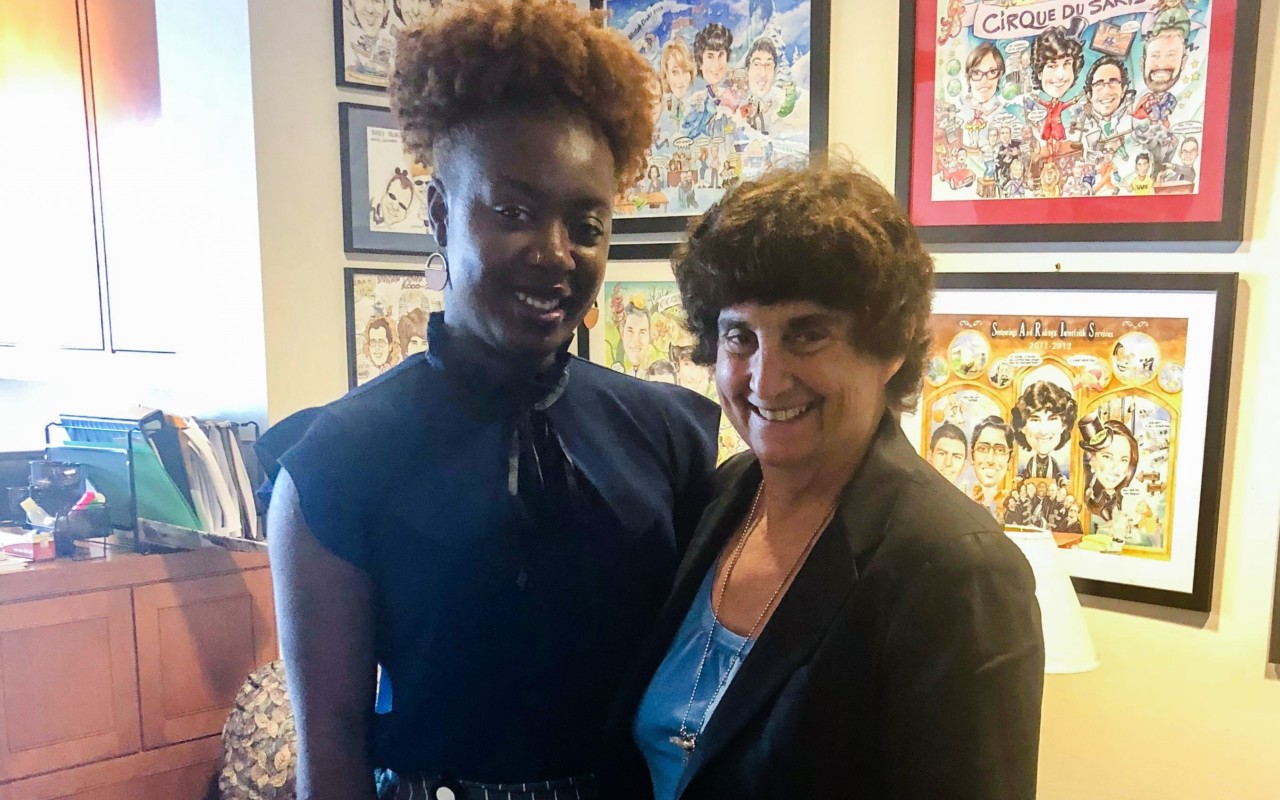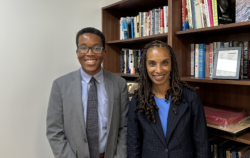
Ubben Posse Fellow Interviews: Hon. Patti Saris
The Jeff Ubben Posse Fellows Program awards five exceptional Posse Scholars $10,000 each and the chance to spend 4-6 weeks during the summer shadowing and learning from a major industry leader. The interview below with Hon. Patti Saris, Chief United States District Judge of the United States District Court for the District of Massachusetts, was conducted by Posse Scholar Princess Adeyinka, now in her junior year at Lafayette College, who worked with Chief Judge Saris as a 2018 Jeff Ubben Posse Fellow. The conversation has been edited and condensed.
PRINCESS: Tell me about your childhood. What was it like growing up?
CHIEF JUDGE PATTI SARIS: I grew up in the Boston Public School System and lived in a nice area. My dad was a dentist in Jamaica Plain and my mom had been a nurse. I grew up in a very 1950s house in a very 1950s lifestyle with my mom who stayed at home and loved us and took care of us.
Then I went to the Girls Latin School which was a Center City High School and they gave me a fabulous education there, but I worked really hard. I did maybe five or six hours of homework a night.
It was an all-girls school and was really feminist back in the 60s, a time when feminism was just coming into being. The teachers cared passionately about their girls going to college, their girls having a career, and their girls being leaders. I was always not the happiest student because I was studying so hard. But that’s the school that really got me and all my friends into great colleges. It got me into Harvard. I had no connections or anything and I was able to do well there and get into a great college.
It was a great education not just for the things like literature and Latin, but also because it showed me how to have an enormous amount of work and get it done.
What would you say is the biggest thing you learned from your parents growing up?
Even though it was in the 1950s and 1960s both my parents felt that women could do anything men could do. They both really pushed me to do as much as I could in terms of having a career.
“It showed me how to have an enormous amount of work and get it done.”
They were thrilled I got married to such a nice guy and had four children but they always expected me to have a career and to give back to the community. That was probably the biggest thing that both my mother and my father gave me.
I remember walking on the beach once with my father and I remember him looking at me and saying, “You know, you’re just as smart as any guy. You could be the president of the United States. Just keep that in mind.”
Can you talk a bit more about what it was like for you when you were in college and law school?
Well as I mentioned before, I attended Harvard University. Let me back up and say that I’m Jewish. My grandparents came over from eastern Ukraine, Russia, the Austro-Hungarian Empire, they didn’t speak a word of English and were so poor. I was only second-generation in this country and we did not come from money or wealth. So, even though I my dad was a dentist, we didn’t come from circles where I’d see famous people.
When I went to Harvard, suddenly I was meeting these people who were world-renowned scholars and world-renowned leaders. I remember thinking how the world is a much bigger place than Boston, Massachusetts. In particular there were three major things happening. I started at Harvard in 1969. There was the war in Vietnam, and there were giant protests that closed the school down protesting against the war. In addition, there was the Civil Rights movement which really got going in the 50s and 60s but was still going full-steam into the 70s and there was a lot of Black Power and Black is Beautiful and discussion of things I didn’t really have in high school. Martin Luther King had just been assassinated. And then the third major thing happening was the women’s rights movement.
All of these movements felt very empowering at Harvard. I wasn’t just a student who was trying to get an A, I wanted to improve the world. I think I got that from Harvard. I felt that I actually could do something on a national or world stage.
Then I went right from college to law school, also at Harvard. I loved law school. I’m one of the weirdos who loved it. I enjoyed the logical way of thinking and applying facts to law. When I was in law school, Watergate happened. It was interesting to learn constitutional law during a period of time when the real foundations of our republic were being challenged by what was happening with Richard Nixon and the possible impeachment proceedings. A very interesting time to go to college and law school. I lucked out.
Seeing you in court and seeing your thought process before sentencing someone, you seem to take an approach where you try to fully understand the situation that the defendant is in. What role does compassion play in your field?
Sentencing is something I know a lot about because I was chair of the United States Sentencing Commission. It’s one thing to set policy nationally and have sentencing guidelines as an anchor. In other words, thinking about where a sentencing range should be because of the quantity of drugs, the amount stolen, the harm to a victim, or the use of a gun and all other factors that yield a prescribed range of what the right sentence might be.
“You don't have to be a judge to be a leader.”
But then you need to look at the individual. You first look at the crime and you look at his criminal history, but then you look at who he is and how he got here. They get there in such different ways and you have to account for that. You try and figure out who the person is, ask are they going to recidivate, are they at core good people who made a mistake or are they people who’ve never done anything positive for society before.
Once I’ve sort of assessed who this person is and I’ve decided what the range of the sentence should be and what kinds of probation conditions there are, I also then want to give the person hope. To let them know that you can get out of this. This isn’t the end of your life, to say that you can fight for this.
I also ask what I can do to help you once you get out. At the end of the day, we’re worried about public safety and about making sure this person doesn’t go back to crime, that he lives a lawful and fulfilled life. At the end of it, I’m always trying to inspire them to work it out.
I once said something that I’ve always regretted and never said again. I said it once in 30 years. Somebody kept getting in trouble, and I said to him, "I’m losing hope in you." You could tell it was very hurtful to him. I never said it again. What I say makes a difference and people carry it with them. So, I try to instill hope.
How do you define leadership?
You don’t have to be a judge to be a leader. You don’t have to be president to be a leader. You can be a leader in your community. In fact, I think a lot of the most exciting things happening right now are in communities, in small ways. Whether it’s in education and creative reforms, in nonprofits like Posse, or an innovative thing you can do in a public-school system. You can be a leader in your community.
Leadership sometimes means taking a chance, taking a risk, being willing to lose and to fail because that’s how reform happens. Maybe you’ll fail the first three times but maybe the fourth time you’ll make it. Or maybe somebody else can stand on your shoulders and take it from there.
I also think that you need to be brave. It’s not easy to take unpopular positions. One of the things I hate is being criticized, and no one likes being criticized, but you’re going to be criticized however you act as a leader. You’ll learn from it if the criticism was fair, or you’ll reject it if it’s unfair. But you need to be brave and understand that you’re taking a strong stance and you may get pushback.
Read More:
Ubben Posse Fellow Interviews: Satya Nadella
Ubben Posse Fellow Interviews: Dan Weiss
Ubben Posse Fellow Interviews: Ken Frazier
Ubben Posse Fellow Interviews: Dr. Steven J. Corwin
Meet the 2018 Jeff Ubben Posse Fellows.

